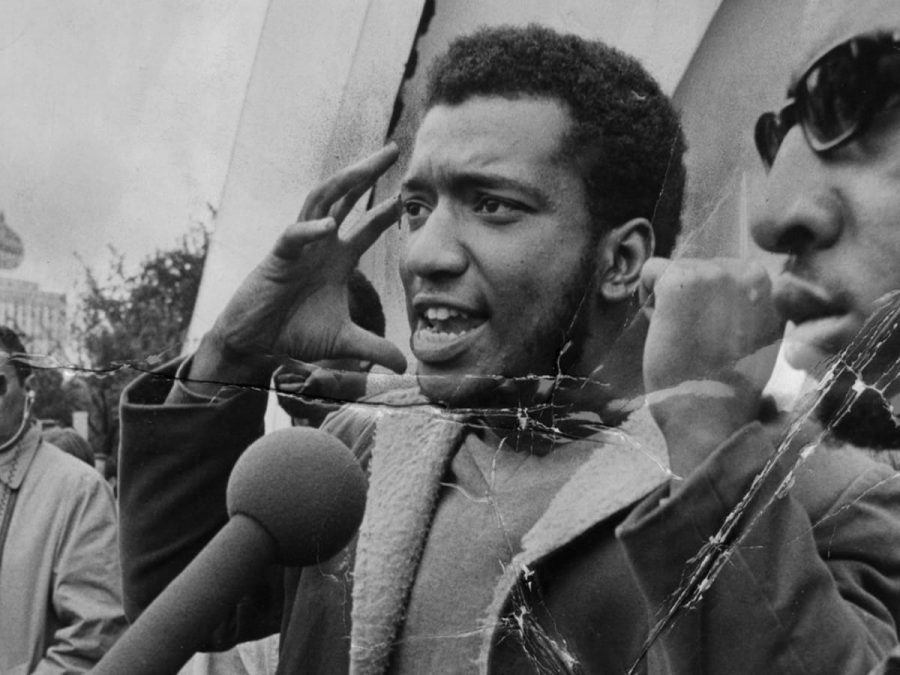“Judas and the Black Messiah” fails to capture the revolutionary spirit of Fred Hampton
Jack Harris ’22 reviews the new film “Judas and the Black Messiah,” and goes over how it fails to pay tribute to its subject matter.
Fred Hampton delivers a speech in 1969.
“Judas and the Black Messiah” is a… complicated film. But not quite complicated enough. Shaka King’s directorial debut tells the story of how Fred Hampton, chairman of the Illinois Black Panther Party, was murdered by the FBI, and how he was betrayed by a fellow Black Panther, Bill O’Neal. The film does an excellent job capturing the atmosphere of the era, but ultimately makes several confounding decisions that hold it back from being a great film, and in some ways insult the memory of Fred Hampton.
The movie is excellently made. It’s obvious how passionate a filmmaker Shaka King is, and his directing is the most impressive aspect of the film, tying everything together to create an immersive viewing experience. The cinematography makes each moment feel more impactful, with each shot feeling as though it has a purpose. The soundtrack is perfect, with the music of 1960s Chicago being perfectly complemented by the original score. Hampton is played by Daniel Kaluuya (Get Out), who does a fantastic job in his performance. Fred Hampton was a larger-than-life figure when he spoke, and the film rightfully declares him a poet. Kaluuya handles these scenes, such as Hampton’s famous “I am a revolutionary” speech, with ease. Kaluuya also brings more depth to Hampton, by shining in the scenes between Hampton and his Fiance, Deborah Johnson. Bill O’Neal is played by Lakeith Stanfield (Sorry to Bother You), is in many ways is the main character of the film. Despite the scenes between Hampton and Johnson, much of the conflict comes from O’Neal’s internal conflict over being an FBI informant. And this is where the film’s issues start to become apparent.
Much of the film had to be fictionalized, due to several reasons. One is that O’Neal virtually never spoke of his time with the Black Panthers, the other being that most FBI officials involved with the assassination are known to have lied about what actually happened. So the film does a bit of editorializing. The film depicts O’Neal as a man who is broken by his work, and an emotional wreck by the end of the movie. O’Neal took his own life in 1990, so no one will ever know for certain what was going through his head but there are two facts that paint a different picture. One is that O’Neal remained an FBI informant for five years after the assassination, and the other is that O’Neal had a grudge against Hampton, after an incident where Hampton demoted O’Neal for attempting to torture potential informants. I am not saying that the depiction of O’Neal is wrong, and in fact, at times the fact that a white FBI agent is controlling this young black man works well for the narrative, but, it does come off slightly questionable that the film gives O’Neal a greater impact than Hampton.
The other issue with the amount of focus on O’Neal is the attention taken away from Hampton. As great as Kaluuya’s performance is, he does not get enough screen time to capture the man he was cast to play. Fred Hampton’s politics of social revolution for the people, by the people, and his message of unification, are reduced down to throwaway sentences. Socialism is mentioned in passing throughout the movie, despite it being the basis of the Black Panther Party.
Ultimately, the film fails to capture Fred Hampton. At the end of the film you still don’t really understand why the FBI decided to assassinate him, or why J. Edgar Hoover feared he would be the Black Messiah. Because, in truth, that’s exactly what Fred Hampton was going to be. Fred Hampton was 21 when he was murdered, and was going to be named the party’s central committee chief of staff, and was already being considered as the future leader of the entire Black Panther Party. But that would not have been enough for Fred Hampton. The man who began cooking breakfast for hungry children at age 10, organized a movement for teachers’ rights while in high school, and united the disenfranchised peoples of Chicago would not have stopped. Ever. That is why the FBI was scared of Fred Hampton. It’s why he was murdered. It’s why he could’ve been the Black Messiah.
Your donation will support the student journalists of West High School. Your contribution will allow us to purchase Scholarship Yearbooks, newsroom equipment and cover our annual website hosting costs.

(he/him) Jack is the online copy editor & arts editor for WSS. He's a senior at west and is also involved in the west high Orchestra as a cellist....



